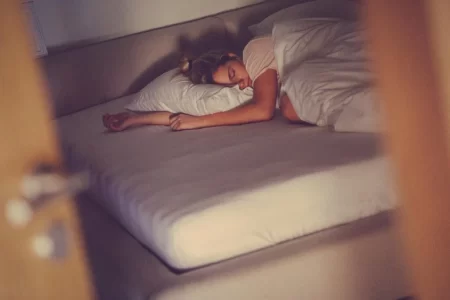How Is Insomnia Treated?
- Updated on: Jun 26, 2024
- 5 min Read
- Published on Apr 19, 2021


Treatments for insomnia
Insomnia is a common disorder that makes it hard to sleep.
Many treatment options are available for insomnia. Good sleep habits and a healthy diet and lifestyle can improve many symptoms of insomnia. Sometimes, the condition improves by making changes to your bedtime habits. If these don’t work, see your doctor who will be able to prepare a treatment plan.
You doctor may recommend cognitive behavioral therapy and/or medication in certain cases.
If insomnia occurs due to any other underlying medical condition or substance use, treating or managing this may help return your sleep to normal.
Various available treatment options are discussed below.
A Healthy Lifestyle (Sleeping Habits)
Often, making certain changes to your lifestyle can return your sleep back to normal. You can try some of these things:
- Go to bed when you are tired
- Try to maintain fixed sleep timings. Go to bed sand wake up at the same time every day.
- Use your bedroom only for sleep and sex.
- Avoid activities that stimulate your brain in the bedroom such as use of TV, computers, smart-phones, and reading etc
- Try to reduce the stresses in your life. These might be due to work or family-related problems. Stresses can disrupt your sleep.
To improve your sleep, here are some more lifestyle-related things you can try:
Quit Smoking
If you smoke, it’s time to quit it. Cigarettes contain nicotine, which is a stimulant that triggers insomnia. Smoking can lead to other problems that contribute to developing sleep problems such as these:
- Strokes
- Cancer
- High blood pressure
- Heart problems
Avoid these drinks
It is important that you avoid drinking too much of alcohol. Alcohol is a sedative that may though induce sleep initially, but it ultimately disrupts your sleep.
Heavy drinking for a longer period of time can also cause other medical problems that may worsen your symptoms of insomnia. These include high blood pressure, heart problems, stroke, and respiratory problems.
Caffeinated drinks such as coffee and soft beverages are also stimulants. If these are consumed a few hours before bedtime, they can heavily disrupt your sleep. Researchers recommend avoiding caffeine at least six hours before you go to bed.
Drinking of any fluid, in general, before bedtime can cause sleep problems and should be avoided.
Maintain a healthy diet
A healthy diet is important for overall well-being of a person. You should avoid:
- foods that are high in saturated fat
- foods which may cause you heartburn, indigestion, and other bowel problems
- foods that are hard to digest
- taking food late in the night
Exercise
Exercising most of the days of a week for about 20 to 30 minutes can improve your sleep. You might not see results immediately, but it’s going to help in the long run. Keep continuing it.
Researchers found in several studies that that exercising one day does not necessarily mean that it would deliver a good sleep that night. However, they agree that a regular exercise over a period of few months (3-4 months) improve your sleep condition.
A regular exercise also helps prevent several serious medical conditions that may otherwise encourage insomnia.
Cognitive and Behavioural Treatments
If making changes in your sleeping habits doesn’t help, your doctor may consider a type of cognitive behavioural therapy (CBT).
CBT includes behavioral changes (such as considering a fixed bedtime and wake up time, moving out of bed after you are awake for 15-20 minutes or so, and avoiding daytime naps) and cognitive or thinking aspects.
The objective of CBT is to change those thoughts and behaviours that may be causing or contributing to your insomnia.
CBT has been found to be an effective treatment and can have long-lasting results. This may include such as:
Sleep restriction therapy
Your doctor may ask to limit the amount of time you spend while being awake in bed. This helps in setting a sleep schedule. At first, you will limit your total time in bed to the typical short length of time you’re generally asleep.
He or she may ask you to create mild sleep deprivations. Then, sleep time will be increased after sleep deprivations as your sleeping condition improves. In fact, once your sleep is improved, your time in bed gradually increases.
Stimulus-control therapy
Its objective is to help you connect with the sleep conditions and establish a regular sleep/wake pattern.
For example, you might be trained to consistent bedtime and wake time and avoid daytime naps. Your trainer may coach you to leave the bedroom if you can’t go to sleep within 15 minutes, and return only when you feel sleepy.
Light therapy
Some doctors recommend light exposure for people who fall asleep quite early at night or wake up too early in the morning. This helps to adjust their internal clock.
Relaxation training
The purpose is to reduce tension or thoughts that may be disturbing your sleep. Approaches may include meditation, muscle relaxation, and others.
Biofeedback
Sensors are placed on your body to measure your body’s functions. A machine connected to the sensors produces pictures or sounds to help you understand when you’re not relaxed or comfortable. This information can also help understand patterns that affect your sleep.
Sleep environment
Creating a comfortable sleep environment, such as keeping your bedroom quiet, calm, dark and cool, and not having a TV in the bedroom, and hiding the clock from view, can improve your sleep condition and help overcome insomnia symptoms.
Insomnia Drugs
There are several types of drugs for insomnia, including over-the-counter and prescription medications.
Your doctor will decide about which drugs are suitable for you based on your insomnia symptoms and many other health conditions. Read about insomnia signs and symptoms.
It’s very important to consult with a doctor before taking a medicine for sleep.
Prescription sleeping tablets
Sleeping tablets or sleeping aids (hypnotics) are drugs that encourage sleep. They were commonly used to manage insomnia in the past, but these are generally avoided nowadays. Doctors are reluctant to recommend them as a long-term treatment (not more than 3-4 weeks) because they just cover the symptoms without treating the cause behind insomnia. Read about causes of insomnia.
They medicines can even cause serious side effects and some people may become dependent on them so they won’t be able to sleep without taking these medicines. These are habit-forming medicines.
They generally include sedatives, tranquilizers, and anti-anxiety drugs.
These are considered only in certain situations such as:
- when insomnia symptoms are severe
- to help relieve short-term insomnia as a temporary measure
- if other treatment options such as changes in sleep habits, cognitive and behavioral treatments don’t work
Common prescription sleep medicines are:
- zolpidem (Ambien)
- trazodone (Desyrel)
- ramelteon (Rozerem)
- zaleplon (Sonata)
- eszopiclone (Lunesta)
Over-the-counter sleep aids
Many sleeping tablets are available to buy over the counter (OTC) from pharmacies/chemists. Some people take non-prescription sleep medications, such as antihistamines, to cause a little bit of drowsiness. Antihistamines can reduce the quality of sleep and cause several side effects such as dry mouth, drowsiness, and blurred vision.
Taking OTC sleeping medicines regularly isn’t recommended by doctors, because it’s not known how effective they are. These drugs do not treat the underlying cause of your sleeping problems and can cause serious side effects.
Benzodiazepines
Benzodiazepines are prescription medicines that can reduce anxiety levels and make you feel relaxed. Your doctor may prescribe them but for a short time and only if you have severe insomnia.
Few examples of benzodiazepines are diazepam, temazepam, lormetazepam, loprazolam, and nitrazepam.
Z-drugs
Z–drugs are a newer type of drugs that work almost like benzodiazepines function. Some examples are zolpidem, zaleplon, and zopiclone.
Doctors do not recommend long-term treatment with Z–drugs because they can become less effective over time and these are habit forming. Some people may become dependent on them.











